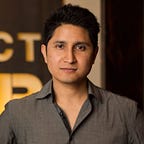This is an excerpt from my latest book Dear Hannah: 70 Methods I Used and Abused to Change Who I Am.
Creativity and the Power of “Letting Go”
Date: July 27, 2005
Age: 23
Location: Tokyo, Japan
Subject: Let the Chips Fall Where They May
Hi Hannah,
Everything’s happening all of a sudden. I’ve spent the last 72 hours pretty much just programming and writing. I’ve barely moved from my position on the living room couch. My flatmates, who are from Germany, Canada, and Spain have been streaming in and out at random hours waving “‘alo,” but eyeing me like I’m some sort of mad scientist, furiously at work.
I think a subconscious part of why I came to Japan is that I’m in dire need of a shake-up. It’s been a year since I graduated from Stanford, and I still have no attachment to any career-like situation. The whole year is chock full of false starts. For three months, I thought I was going to be a journalist. Then for another three months, I thought I was going to run an art gallery. And then I worked at Google. It just doesn’t make sense why nothing has stuck. If you asked me when I was 16 what I thought I was going to do after college, in no way did I envision myself bouncing around like a wayward pinball.
But I wonder if my desperation has been inhibiting me from naturally finding my way. And so I came up with this method: “Let the chips fall where they may.”
One night, when I invoked this thought, I suddenly became aware of the present moment. On my laptop, I noticed a page open to an article about Bernard Goldberg’s book, 100 People Who Are Screwing America, and I became curious about who was on the list. Some I already knew, like Michael Moore (#1) and Ted Kennedy (#3), but others like Arthur Sulzberger (#2), the publisher of The New York Times, I didn’t. So I looked him up in Wikipedia, then I looked up a few others, and after a few minutes, I found myself compiling little notes on all these people. Eventually, after 16 hours, this little personal research project shaped up into something worth publishing. I then posted the book summary on Philosophistry, and shared the link on MetaFilter and Plastic.
I closed my laptop at 4 a.m. and tiptoed into my bed, across from my German roommate, who was oddly enough still awake, with the glow of his laptop lighting his face. When I woke up at 1 p.m. and checked my email, I saw that my little link was already making its way across the blogosphere, getting links on Pajamas Media and some political forums. I couldn’t believe what happened. This was a piece I did mostly for my own personal interest, but somehow it became the first thing of substance to come from my writing.
Emboldened, I invoked it again, “Let the chips fall where they may,” and I told myself, “You know what, I’m curious about virtual currencies. What is the conversion rate between, let’s say, U.S. dollars and World of Warcraft gold coins?” This curiosity then led to another research spree, this time involving programming, and I created an online currency convertor from start-to-finish in the span of two days.
This has been the most enthusiastically productive three days of my life since ThinkQuest ‘98. It’s now become clear to me that you don’t get these perfect stretches of work by thinking about what your perfect career would be. Maybe that’s the secret. No career-assessment tests, no Jung typology analysis. Just. Let. Go.
- Phil
Unfortunately, this method lasted for the whole 72 hours I described in this letter. It’s almost like I wrote this letter when I subconsciously recognized that it was losing its power, as if writing about it would seal the self-improvement lesson. However, I still value the underlying principle of letting go.
Other letters from Dear Hannah about finding work that you love:
• How to Really Pursue One’s Passion
› Creativity and the Power of “Letting Go”
• One Way to Figure out What to Do with Your Life
• How I Found Work that I Love
• How I Got out of My Funk and Got Back to Work
This is an excerpt from my latest book Dear Hannah: 70 Methods I Used and Abused to Change Who I Am.
Before Philip wrote his first line of code, he tried to re-program his mind. For his 14th birthday, Hannah gave him Dale Carnegie’s How to Win Friends and Influence People, which kicked off a life-long obsession with self-improvement. Follow Philip over 82 letters as he re-tells his journey from winning ThinkQuest, to quitting Stanford, to dealing with dating, happiness, and direction, to eventually making it as an indie iOS app developer. Dear Hannah is either a cautionary tale about self-improvement, or it is a filter for the 10% of self-help that may actually change your life.
PHILIP DHINGRA is a President’s Scholar from Stanford University, where he received his B.A. in Mathematical and Computational Sciences. In addition to authoring books on life change, he develops best-selling iOS apps including Nebulous Notes and The Creative Whack Pack (a collaboration with creativity pioneer Roger von Oech). Philip divides his time between Austin, Texas, and San Francisco, California.
